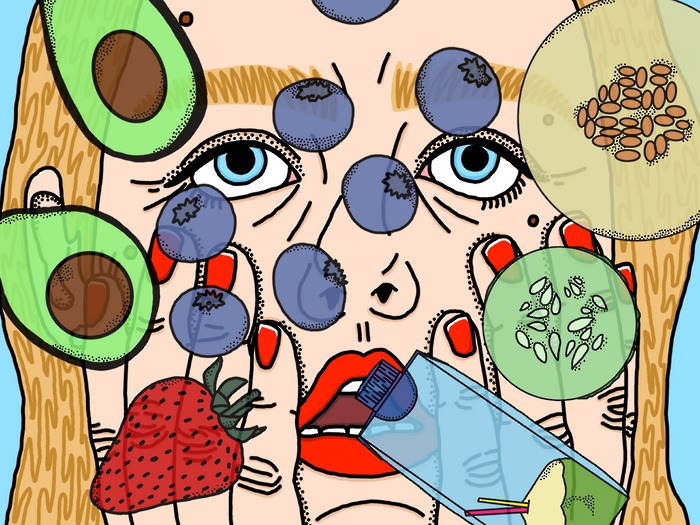We need to talk about the unhealthy ways we discuss food
Many people have triggers around food – Miriam Clifton calls on us to be more careful, loving and considerate with each other
Content Note: This article contains discussion of eating disorders and triggering conversations.
As a general rule, my friends from home and I don’t engage in ‘body talk’. When our internal monologues become too loud, we don’t indulge, we critically examine. Negative thoughts are honoured (“It’s okay and understandable to feel that way”) only so that they can then be properly scrutinised (“Where might that come from?”).
It’s all rather wholesome, and I’m hugely grateful for my utterly unqualified pseudo-therapist friends, who help make my world feel a little safer. (Don’t worry – they don’t serve as a substitute for my actual therapist.) I am immensely privileged to have this support network, as well as the friends I have made since moving to Cambridge in October.
“Having an eating disorder makes you excruciatingly susceptible to casually-flung comments”
But admittedly, I was too sheltered in my assumption that body and diet talk were universally taken-for-granted as subjects to be avoided. Eating disorders can be isolating, so eating surrounded by friends in college has been refreshing for me. Rumour has it my college has a Michelin-starred chef – this luxury hasn’t changed the fact that meal times can sometimes be fucking hard. It’s impossible to ignore comments about how you’re “hungry today” (no, I’m just eating more because I bloody well ought, need and want to) when it was stressful enough making a conscious choice to get more food.
Often it’s a case of someone who still struggles with approaching life through a disordered frame of reference (read: me) interpreting innocent remarks out of context, and I want to emphasise that ultimately it is my own responsibility to manage these triggers. The problem with having an eating disorder is that you tend to be excruciatingly receptive to comments that are casually thrown in any direction within a ten-metre radius. You become ridiculously good at applying them to yourself.
But regardless of my own hypersensitivity, when comments do veer more explicitly into diet territory, surely it isn’t good for any of us to talk about what we eat as if it should ever be a legitimate source of shame or guilt.
“We need to be able to talk at times about things that are at first distinctly unsafe”
I’m by no means proposing that we all pledge to never again speak about food except in an entirely neutral way. Food is rarely devoid of all meaning, and my recovery is slowly helping me to see that there is something quite beautiful about enjoying food with a group of people you love. My point is that we should all be a little more careful about the things we say, for we can never fully know our audience. It is up to us to set firm boundaries and speak up when something bothers us, and not the fault of new friends who don’t have miraculous intuition about our entire mental health history. That doesn’t necessarily mean ‘calling someone out’ over dinner (there’s a time and a place, and mealtimes are rarely the time nor the place) but rather making an active effort to have more honest conversations.
Let’s not wrap ourselves in an insulating safety blanket of warm words. To make our worlds truly safer and more compassionate, we need to be able to talk at times about things that are at first distinctly unsafe – things that are uncomfortable or painful to admit about our own inner voices and anxieties.
I’ve also learnt that we should try to be more compassionate towards ourselves – a lot of us flex our feminist credentials and claim a significant degree of wokeness, but continue to be both privately and publicly cruel about ourselves. All of us deserve to eat, not because we’re enlightened social justice warriors or rowers or netball players, but because we’re alive – a criteria far less demanding than that set by Cambridge admissions. We all deserve to enjoy the food we eat. More than that, it can be a wonderful experience to eat for the sake of pleasure alone.
In short: let’s all try to be a little kinder. Yes, to our new friends, who may just not understand. But also, I beg, to the people we sit with in hall, who just want to eat their food in a little more peace
 News / Clare Hall spent over £500k opposing busway 24 December 2025
News / Clare Hall spent over £500k opposing busway 24 December 2025 Comment / The ‘class’ of Cambridge24 December 2025
Comment / The ‘class’ of Cambridge24 December 2025 News / Caius mourns its tree-mendous loss23 December 2025
News / Caius mourns its tree-mendous loss23 December 2025 Comment / League tables do more harm than good26 December 2025
Comment / League tables do more harm than good26 December 2025 News / Girton JCR publishes open letter expressing solidarity with Palestine25 December 2025
News / Girton JCR publishes open letter expressing solidarity with Palestine25 December 2025









